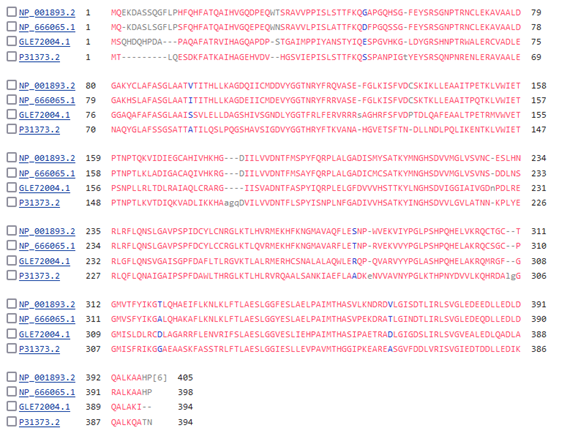User:João Pedro de Carvalho Pereira/Sandbox 1
From Proteopedia
(Difference between revisions)
| Line 24: | Line 24: | ||
The <scene name='97/973103/Dominio_maior/1'>larger domain</scene> is characterized by the presence of an alpha/beta/alpha structure, and a mixed beta-sheet surrounded by eight alpha-helices. On the other hand, the <scene name='97/973103/Dominio_menor/2'>smaller domain</scene> possesses a four-stranded antiparallel beta-sheet and three alpha-helices on one side of the beta-sheet.<br> | The <scene name='97/973103/Dominio_maior/1'>larger domain</scene> is characterized by the presence of an alpha/beta/alpha structure, and a mixed beta-sheet surrounded by eight alpha-helices. On the other hand, the <scene name='97/973103/Dominio_menor/2'>smaller domain</scene> possesses a four-stranded antiparallel beta-sheet and three alpha-helices on one side of the beta-sheet.<br> | ||
<br> | <br> | ||
| - | Within the larger domain, more specifically in the active <scene name='97/973103/Ligacao_plp/1'>binding site</scene> for PLP, the amino acid residues that effectively engage with this ligand are situated in the central region of the beta sheet and in close proximity to adjacent alpha helices. A total of six amino acids establish hydrogen bond interactions (Gly<sup>90</sup>, Leu<sup>91</sup>, Asp<sup>187</sup>, Ser<sup>209</sup>, Thr<sup>211</sup>, and Lys<sup>212</sup>). Moreover, two amino acids from the neighboring subunit also establish hydrogen bond interactions with PLP(Tyr<sup>60</sup> and <sup> | + | Within the larger domain, more specifically in the active <scene name='97/973103/Ligacao_plp/1'>binding site</scene> for PLP, the amino acid residues that effectively engage with this ligand are situated in the central region of the beta sheet and in close proximity to adjacent alpha helices. A total of six amino acids establish hydrogen bond interactions (Gly<sup>90</sup>, Leu<sup>91</sup>, Asp<sup>187</sup>, Ser<sup>209</sup>, Thr<sup>211</sup>, and Lys<sup>212</sup>). Moreover, two amino acids from the neighboring subunit also establish hydrogen bond interactions with PLP(Tyr<sup>60</sup> and Arg<sup>62</sup>)<ref name="dois"/>. |
Revision as of 14:48, 25 June 2023
Cystathionine gamma-lyase (Homo sapiens)
| |||||||||||
References
- ↑ 1.0 1.1 Chiku T, Padovani D, Zhu W, Singh S, Vitvitsky V, Banerjee R. H2S biogenesis by human cystathionine gamma-lyase leads to the novel sulfur metabolites lanthionine and homolanthionine and is responsive to the grade of hyperhomocysteinemia. J Biol Chem. 2009 Apr 24;284(17):11601-12. doi: 10.1074/jbc.M808026200. Epub 2009, Mar 4. PMID:19261609 doi:10.1074/jbc.M808026200
- ↑ 2.0 2.1 2.2 Messerschmidt A, Worbs M, Steegborn C, Wahl MC, Huber R, Laber B, Clausen T. Determinants of enzymatic specificity in the Cys-Met-metabolism PLP-dependent enzymes family: crystal structure of cystathionine gamma-lyase from yeast and intrafamiliar structure comparison. Biol Chem. 2003 Mar;384(3):373-86. PMID:12715888
- ↑ Adaikan PG, Karim SM. Effects of PGA and PGB compounds on gastrointestinal tract smooth muscle from man and laboratory animals. Prostaglandins. 1976 Jan;11(1):15-22. PMID:1257494 doi:10.1016/0090-6980(76)90168-4
- ↑ Scott CR, Dassell SW, Clark SH, Chiang-Teng C, Swedberg KR. Cystathioninemia: a benign genetic condition. J Pediatr. 1970 Apr;76(4):571-7. PMID:5420794 doi:10.1016/s0022-3476(70)80407-3
- ↑ Wang J, Hegele RA. Genomic basis of cystathioninuria (MIM 219500) revealed by multiple mutations in cystathionine gamma-lyase (CTH). Hum Genet. 2003 Apr;112(4):404-8. Epub 2003 Feb 6. PMID:12574942 doi:10.1007/s00439-003-0906-8
- ↑ 6.0 6.1 Sun Q, Collins R, Huang S, Holmberg-Schiavone L, Anand GS, Tan CH, van-den-Berg S, Deng LW, Moore PK, Karlberg T, Sivaraman J. Structural basis for the inhibition mechanism of human cystathionine gamma-lyase, an enzyme responsible for the production of H(2)S. J Biol Chem. 2009 Jan 30;284(5):3076-85. Epub 2008 Nov 19. PMID:19019829 doi:http://dx.doi.org/10.1074/jbc.M805459200

